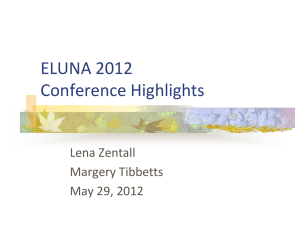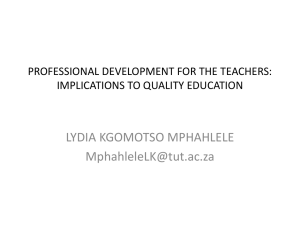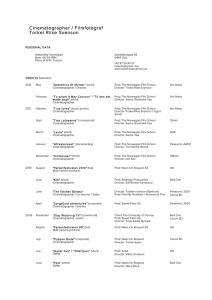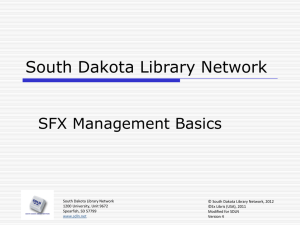exercise - mgapapeles
advertisement
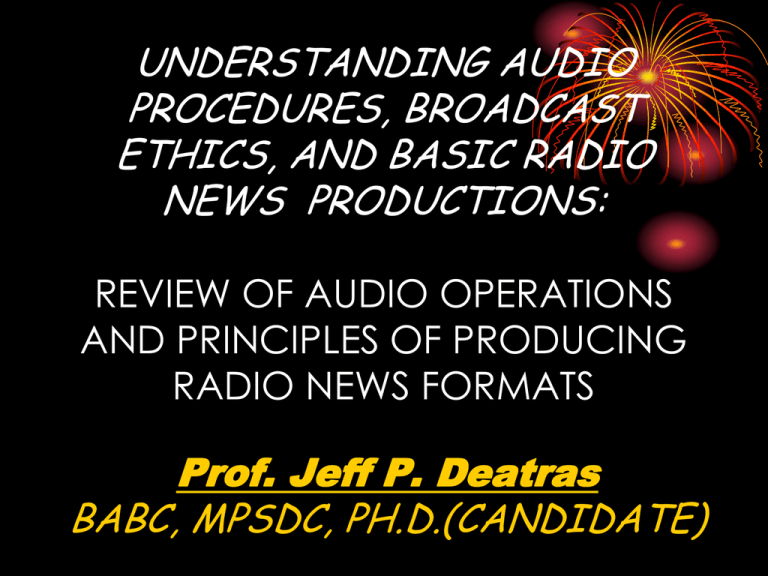
UNDERSTANDING AUDIO PROCEDURES, BROADCAST ETHICS, AND BASIC RADIO NEWS PRODUCTIONS: REVIEW OF AUDIO OPERATIONS AND PRINCIPLES OF PRODUCING RADIO NEWS FORMATS Prof. Jeff P. Deatras BABC, MPSDC, PH.D.(CANDIDATE) Pressures and Philippine Radio Production Ethics and Practices • Mass media in the Philippines, with its oligarchic and liberal nature has evolved along the fusion of principles and theories of Western (American and European) traditions of liberal ethics and practices. • The task of effectively delivering messages (information and entertainment) is over and above practitioners and individual personalities. • Everybody in the media industry is a slave to such ethics and practices indeed. Ethics and Practices on Time • Filipino radio broadcasters schooled in the western tradition but faced with unique local context have institutionalized ethical principles and discipline on time observed through the years • Late submissions of scripts, materials, execution, preparation, among many others, are met with stringent sanctions----------suspension or job loss! • Power holders in the radio industry put primary emphasis on urgency through live on the spot coverage or intermittent flash reports of day’s news. Ethics and Practices on Time • Academic institutions teaching radio production must therefore reflect such realities in the industry. • No student should pass courses on media production without strictly understanding the value of time. • In media, “TIME IS MORE EXPENSIVE THAN GOLD” • Newsworthy events neglected by undisciplined broadcasters are profits lost for an enterprising broadcasting company. • Death is the only reason a broadcaster can explain his/her tardiness or absence. NO REASON IS REASONABLE FOR ABSENCE OR TARDINESS IN MEDIA PRODUCTION • In class, mentors must subject tardiness and absence as misbehavior getting conditioned or failed mark! Guides to Accurate Production Time • Cue needed soundtracks 3-5 seconds before the target sound • Based on its sequence in the script, record soundtracks alternately in two disks (e.g. MSC 1 in CD1 and MSC 2 in CD 2). Back-up these in at least another pair/s of disks. • Rehearse, record, and wisely revise script, at least five times before actual prod with all needed materials, complete cast and crew. Guides to Accurate Production Time • Manual SFX and soundtracks must be placed and sequenced as they appear in the script. Prepare them without inviting accidents such as choking and electric shocks. • Always remind everyone of their major roles and additional tasks. • Begin and end rehearsals on time using hand signals and cue cards rather than loud shouts and nonsense laughs. Guides to Accurate Production Time • Wise revisions of the script means minor touches during rehearsals and major modifications after group brainstorming sessions. • Retain the 5W’s and 1H of news and information scripts. Retain the creative elements of narrative scripts (normal conditions, problem-conflict, heightening of the problem until the climax, resolution and reversals). All creative revisions should retain such elements whether it goes for compression or expansion. • Directions should be well-thought and planned as one re/writes the script. Poor timing are partly due to nonsense arrangements and transitions of soundtracks. Sanctions to Misbehaviors in Radio Productions • Violation of punctuality or attendance in production activities-------EXPULSION FROM TEAM OR FAILED MARK. • Uncalled and unrecognized speaking, passing of nonverbal messages, whispers, distractive gestures------EXPULSION FROM ACTIVITY OR FAILED MARK • All forms of cheating------FAILED TERM OR FINAL GRADE (according to the extent and manner). PRINCIPLES OF RADIO PROD • In a group of more or less 8-10 members, 5 will do the role of the production crew and cast, the remaining 3-5 will be AD’s to maintain the IDEAL LEARNING AND COMMUNICATION FLOW in class. • As the production crew does the exercise, the AD’s will prepare the critique of the performance. Other class members uninvolved may prepare their critique as well. • Other than the instruction from the professor, all communication once the activity begins should be done in hand or cue-card signals. • SANCTIONS WILL BE STRICTLY OBSERVED. PRINCIPLES OF RADIO PROD • All AD’s will receive sanctions if they themselves misbehave or unable to determine other violators in class. • Using the PRINCIPLE: COMMAND RESPONSIBILITY, the professor will assume the role of the EP or SM. • All members of the production crew must be accountable to the mentor and are graded according to how each assigned roles are performed • Critiques from class members will be taken as individual quizzes, grades determined by the professor. PRINCIPLES OF RADIO PROD • Other than major examination productions, regular production exercises will constitute as quizzes for members of the crew • Major production examinations will be divided into two parts: ORAL AND PRODUCTION EXAMINATION. • Point system between two-part examinations will constantly vary according to what is ideal and reflective of broadcast industry standards. PRINCIPLES OF RADIO PROD • During production examinations, reflecting the actual radioairing of a produced material, the professor will determine the group grade------EVERYONE GETS THE SAME GRADE. Reasonably, the group deserves the freedom to assign roles to capable and excellent members. • The logic for group grade comes from the fact that in real radio programming, actual airing or productions are done only once. Success or failure, it happens only once. • The group/team is likewise rightful to sanction misbehaving members. PRINCIPLES OF THE ORAL EXAM • Oral examinations will be graded individually. • Questions will be based on the experiences learned, principles applied, and theories understood by students from lectures, discussions, and production exercises. • Moreover, a special emphasis will be given to student’s awareness of the actual production conditions reflected by realistic radio programs in major station------DZMM, DZBB, DZRH, AND OTHER REIGNING FM RADIO STATIONS. • Students are thus advised to voluntarily research or fulfill assigned interviews of the reigning production practices in the industry. Questions for Reflection • Why are the positions of production crew vary according to: a) academic training against realistic practice in the industry; b) production type and nature; c) involvement of budget, manpower skills, and ICT use? • What are the advantages and disadvantages of learning production standards from academic training ad/or from early training in realistic contexts of the industry. • What are the loopholes of academic principles against the real challenges of production in the industry or the problems of realistic practices unguided by academic principles and theories? • What is the future of radio production with ICTS? The Nature of Radio News Prod • Radio news is technically less complicated but demands accurate content and requires the in-depth practice of broadcast journalism • BGM as signature or theme and the creative use of SFX and stingers are its only technical requirements. • Radio news greatest challenges are in the gathering of the news content, writing it into an effective script and airing it on time. • Poor stingers and wrong choices of theme/signature MSC/SFX may prove news program ineffective though. Nature of Live vs Recorded Prod • Live radio prod requires spontaneity while recorded ones requires further creativity • Radio news and musical programming are mostly done live while narrative programs are usually recorded. • Production crew and talents for live prod are required to be flexible and spontaneous while the wellrehearsed nature of recorded narrative are well-written and performed following brevity and well chosen wordcontent that warrants replaying. • In the radio, all productions aired are recorded anyway Producing Stingers and Theme Sound • Stingers should be produced from the combined music, SFX and voice that mentions the slogan, program title, or the popular name of a radio news anchor • Stingers must sound striking, provoking, and stimulating. • Theme or signature music/SFX are supposed to reflect the urgency and compelling nature of radio news and public affairs program. As BG, it must be lively and worth one’s attention and memory. EXERCISE • In a group of 8-10 members, formulate a proposal plan of a radio news program with complete parts as rationale, objective, conceptual strategy/method, airtime, budget, etc. • Submit a recorded stinger (3-5 seconder) and a theme music/SFX (30-seconder or 1-minuter) • Proposal should be defended and critiqued in class • Stinger and theme music/SFX will be evaluated as to its relevance to the proposal and its technical and creative aspects. Prod Plan and Proposal Speech Performance in News and Musical Radio Productions EXERCISE • In a group of 8-10 members, conceptualize A) a 30seconder ad-commercial about an existing product exclusively assigned by the mentor and; B) a oneminuter flash-report/newsbreak which details will be given a few minutes before the production. • Group members must have different concept, strategies, format, and genre for the ad. • Both ad and flash-report/newsbreak must use distinct and different BGM and SFX. • Entire production ends at exactly one minute and thirty seconds. EXERCISE • PD will have a day to audition talent/s of his/her choice. • Talent/s should be capable to perform both the adcommercial and at the same time adjust to the urgent script of the NEWSBREAK. • News details for the flash-report/newsbreak will be given by a member of the class not involved in the production, whom should be chosen and instructed by the professor. • Such chosen news-informant must assume roles as “reliable source” or “subject of the news” himself/herself. He/she may be interviewed live via phone. EXERCISE • News-informant should write information for both the PD and professor in a piece of paper to be submitted as his/her quiz in 100-150 words before the prod. • Either as source or subject, informant must relate his/her fictitious story into current events and news of the day. • PD must write an urgent script for the newsbreak as accurate, concise and, complete as possible. • PD can be a talent for his/her production but must remember to take note of the errors of his/her crew which will be the basis of grading. • PD’s notes of the errors will be announced loudly as he/she gives individual grades. Professor replies with objections, affirmations, elaborations, and asks further critique from class members. EXERCISE • PD is responsible for the crew’s grade. Irresponsible and irrational grading will be deducted from the PD though. • PDs will be picked by random. Hence, the entire day’s class is given to a group but not all PDs may be picked. • With all the post-prod and critiquing that follows after every PDs’ prod, the entire period will be utilized to pick as many PDs as possible, at least three preferably. • It is wise for PDs to get talents from classmates if doing it himself/herself hinders the task of tracking down the errors of the prod crew. • Quiz scores will be taken from the a) two lowest scores, b) the total average and; c) critique as added point. EXERCISE • Professor will announce role assignments from the group table of production role. • All groups are required to submit a matrix or table of production role assignments and crew-names on the first day of production of the first group • Every second under-time or overtime will receive 5points minus from 100. • Every error of crew/talent performance or unperformed directions in the script will get 5points minus from 100. • All sanctions from house-rules and protocols still apply. Required Table of Crew Roles PD NAME NAME AD (1-5) TD FD SPNR CRIT TOTAL



